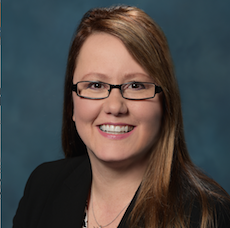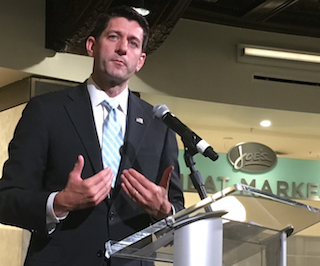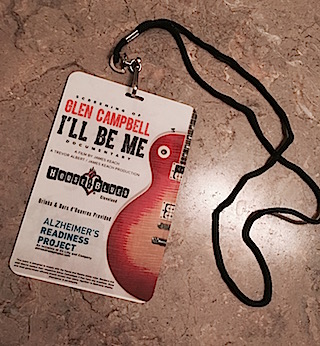
The Republican National Convention has ended, and this week, the Democratic Party takes its place in the spotlight with its gathering in Philadelphia.
But while the attention was on activities in Cleveland last week, the Republican National Committee released a platform Tuesday that, among areas of importance to senior living providers and their residents, focused on home-based long-term care and elder abuse prevention. Health, however, seemed more of a focus at events timed to coincide with the RNC rather than at events directly related to it.
Alzheimer’s disease was mentioned, however briefly, during a panel discussion on healthcare last Wednesday that I was fortunate to attend.
 A cure for Alzheimer’s is “still a ways away,” acknowledged panel moderator Margaret Anderson (center in the accompanying photo), executive director of the Milken Institute’s FasterCures/The Center for Accelerating Medical Solutions, in the rotunda of an early 20th-century bank that is now a grocery store in downtown Cleveland just blocks from the arena where the convention was held. The nonpartisan Milken Institute, along with the Bipartisan Policy Center, sponsored the evening, which featured policymakers and business leaders addressing the topics of medical innovation, entrepreneurship and economic growth, infrastructure and energy policy, and global competitiveness and tax policy. House Speaker Paul Ryan (pictured below) opened the event with remarks on tax reform.
A cure for Alzheimer’s is “still a ways away,” acknowledged panel moderator Margaret Anderson (center in the accompanying photo), executive director of the Milken Institute’s FasterCures/The Center for Accelerating Medical Solutions, in the rotunda of an early 20th-century bank that is now a grocery store in downtown Cleveland just blocks from the arena where the convention was held. The nonpartisan Milken Institute, along with the Bipartisan Policy Center, sponsored the evening, which featured policymakers and business leaders addressing the topics of medical innovation, entrepreneurship and economic growth, infrastructure and energy policy, and global competitiveness and tax policy. House Speaker Paul Ryan (pictured below) opened the event with remarks on tax reform.
 Healthcare panelist Freda Lewis-Hall, M.D. (left in group photo), chief medical officer and executive vice president of Pfizer, said that public–private partnerships and increased patient participation in clinical trials are two ways that medical innovation can be accelerated. She noted, for instance, a partnership between industry, academic institutions and the National Institutes of Health’s National Center for Advancing Translational Sciences to house information on drugs that were studied and found to be ineffective for one indication but that might prove useful for other investigators to study for other indications.
Healthcare panelist Freda Lewis-Hall, M.D. (left in group photo), chief medical officer and executive vice president of Pfizer, said that public–private partnerships and increased patient participation in clinical trials are two ways that medical innovation can be accelerated. She noted, for instance, a partnership between industry, academic institutions and the National Institutes of Health’s National Center for Advancing Translational Sciences to house information on drugs that were studied and found to be ineffective for one indication but that might prove useful for other investigators to study for other indications.
“We have all of the tools, energy and resources,” Lewis-Hall said. “We just need the intent and the leadership to bring them together.”
Pfizer makes drugs for heart disease, diabetes and other indications and is studying potential drugs for Alzheimer’s and Parkinson’s as well as potential vaccines against Staphylococcus aureus infection and Clostridium difficile colitis.
Right now, “We’re delivering Star Wars medicine into a Flintstone healthcare system,” Lewis-Hall said.
Panelist Robert Hugin (right in group photo), executive chairman of Celgene, developer of drugs for psoriasis and cancer, noted a 2012 Institute of Medicine study that found that $750 billion was wasted in the healthcare system the previous year. Much inefficiency still exists, he said, adding that one way to lessen it would be to make it legal for healthcare company representatives to speak with one another.
 Healthcare — specifically, Alzheimer’s disease — was the exclusive focus of an event that had been held a few blocks away earlier Wednesday. There, elected officials, campaign representatives, advocates and others had the chance to see the documentary “Glen Campbell: I’ll Be Me,” as well as a short musical performance by two of his adult children, Shannon and Ashley. The three-hour event, held at the House of Blues and also timed to coincide with the RNC, was organized by the Alzheimer’s Readiness Project, an initiative of the Eli Lilly and Co. that was begun in June.
Healthcare — specifically, Alzheimer’s disease — was the exclusive focus of an event that had been held a few blocks away earlier Wednesday. There, elected officials, campaign representatives, advocates and others had the chance to see the documentary “Glen Campbell: I’ll Be Me,” as well as a short musical performance by two of his adult children, Shannon and Ashley. The three-hour event, held at the House of Blues and also timed to coincide with the RNC, was organized by the Alzheimer’s Readiness Project, an initiative of the Eli Lilly and Co. that was begun in June.
We have yet to see what issues of interest to the senior living industry will be discussed this week in Philadelphia at the DNC. Today, however, timed to coincide with the convention, the Alzheimer’s Readiness Project will sponsor a forum on Alzheimer’s disease hosted by The Atlantic.
And the Bipartisan Policy Center and Milken Institute will sponsor more panel discussions at a Wednesday event in the City of Brotherly Love.



